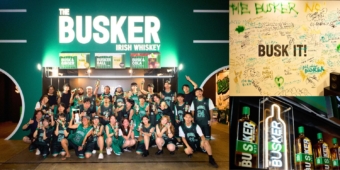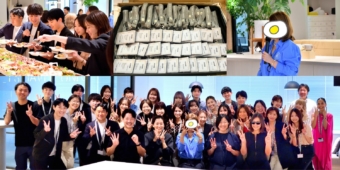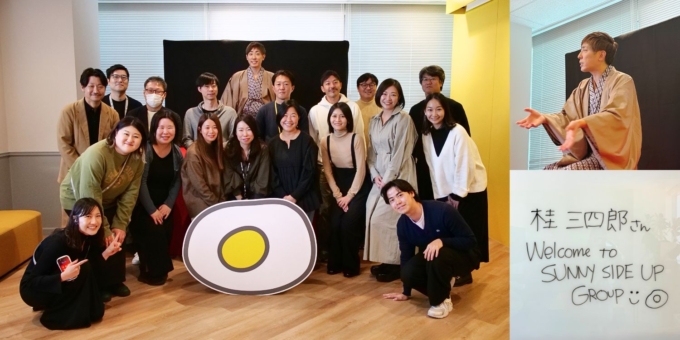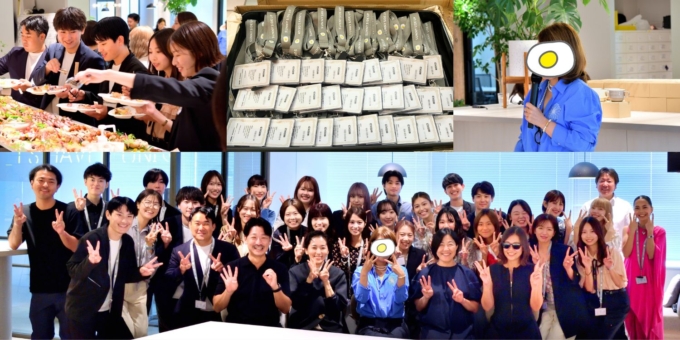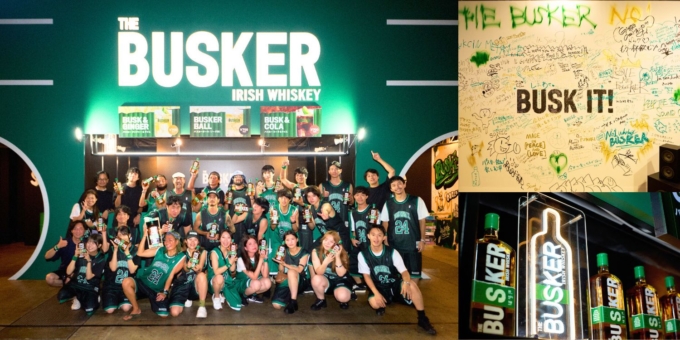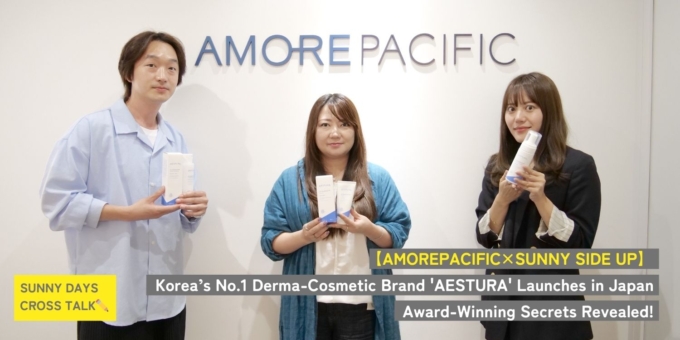SUNNY SIDE UP GROUP Earns “B Corp™ Certification!” A Discussion on a Sustainable Society with B Market Builder Japan Co-Representative, Ms. Torii
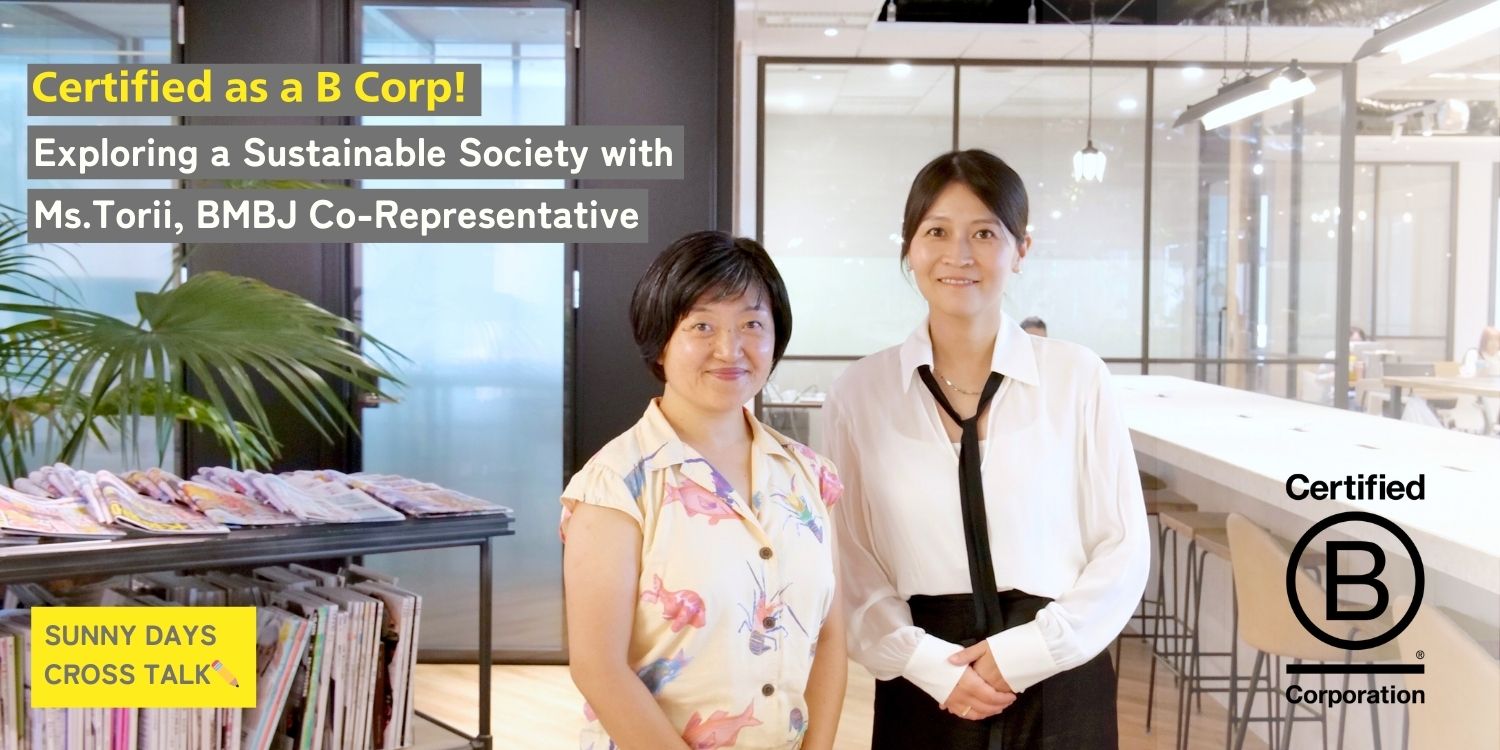
In June 2024, SUNNY SIDE UP GROUP (SSUG) earned the B Corp Certification, a global standard recognized as a mark of commitment to sustainability.
This certification is gaining attention in Japan, with more companies actively seeking it. But how does this system work, and what unique value does it offer?
This time, we held a cross-talk with Nozomi Torii, Co-Representative of B Market Builder Japan, which promotes the B Corp movement, and Emi Tanimura, Executive Officer of SSUG, who led the company’s B Corp certification process. They discussed the B Corp certification itself, the current state of sustainability in Japan, and their vision for the future following certification.
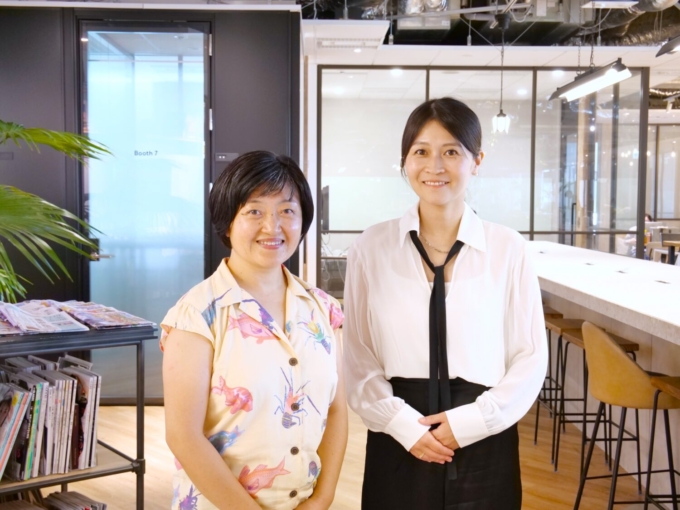
What is “B Corp Certification,” the Mark of a Sustainable Company?
ーーIn the first half, we’d like Ms. Torii to explain what B Corp Certification is all about. To start, could you tell us about the certification itself?
Ms. Torii:B Corp began in 2006 in the United States as a movement to change society through business. The “B” in B Corp stands for “Benefit for all,” meaning benefits for everyone — both people and the planet.
The B Corp Certification, managed by the U.S.-based nonprofit B Lab™, is awarded to companies that balance social impact with profit. To earn this certification, companies must meet high standards set by B Lab, covering areas such as social and environmental performance, transparency, and accountability.
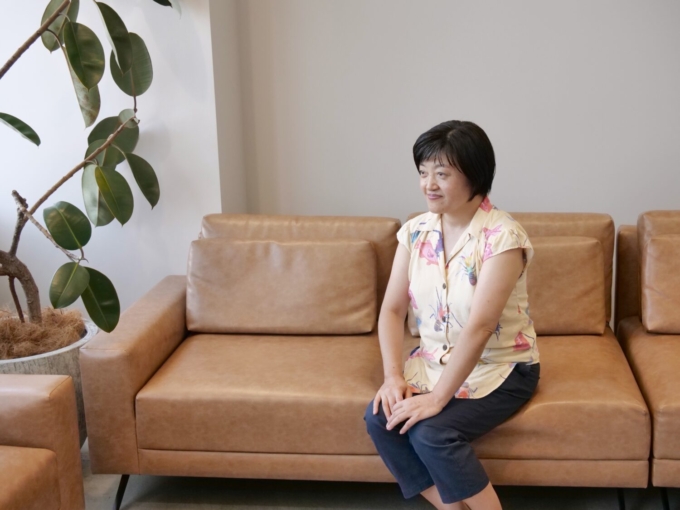
B Corp aims to create an inclusive, fair, and regenerative economy. Achieving B Corp certification is one step on the journey toward this goal.
B Corp Certification is often seen as a mark of a truly sustainable company. While many associate sustainability with environmental efforts, it actually covers much more — including human rights, labor conditions, and reducing gender inequality. Only when these aspects are achieved can we truly call it a “sustainable society.”
As of the end of July 2024, there are 8,943 B Corp-certified companies worldwide. In Japan, 43 companies have achieved B Corp , including SSU, which certified in June. Although Japan’s certification rate may seem low compared to the global numbers, the number of Japanese companies aiming for B Corp certification is steadily growing.
ーーHow can a company obtain B Corp Certification?
Ms. Torii:The journey to B Corp Certification begins with an online assessment called the “B Impact Assessment” (BIA*).
This assessment includes around 200-300 questions across five areas: “Governance,” “Workers,”“Community,” “Environment,” and “Customers.” When the company scores above 80 points based on its responses, it can then apply for B Corp Certification. The application process involves verifying company information, online interviews, document submissions, and a third-party verification before official certification.
*BIA is a free and confidential tool used to measure a company’s impact on its key stakeholders.
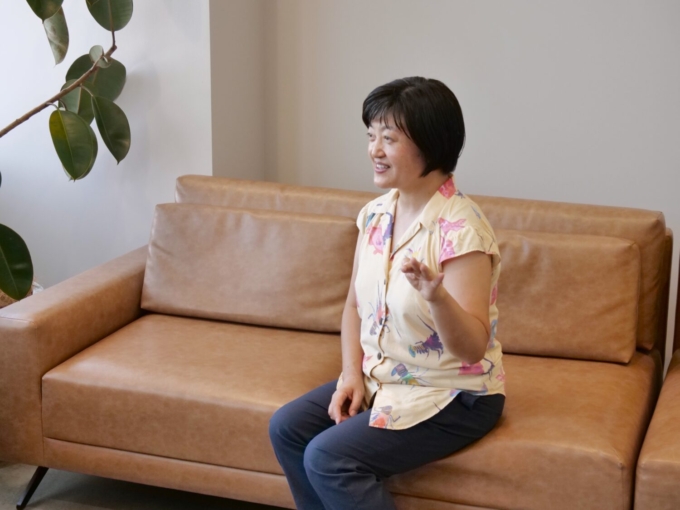
Global Focus on Sustainability and “B Corp Certification”
ーーCan you share insights on the rising global focus on sustainability and the social and environmental impacts expected from B Corp certification?
Ms. Torii:The B Corp Certification program, managed by B Lab, originally began in the United States, and with the assessment conducted in English, it initially gained traction mainly in Western countries. However, today, B Lab Global Partners are driving the B Corp movement in various regions worldwide, helping spread certification across the globe. I believe the increasing global focus on sustainability is a significant factor contributing to the growing attention on B Corp.
The B Corp standards include a category called the “Impact Business Model (IBM),” which reflects the belief that “social impact” and “profit” aren’t opposing concepts but must work together for a business to truly thrive. For companies to increase their revenue, being mindful of society and the environment is essential. I believe that if more businesses and leaders adopt this mindset, it will help create a more sustainable and better society.
While Japan has many excellent companies, some may feel the need to reassess their approach to sustainability without knowing exactly how to take action. Using the B Corp standards can help guide these efforts toward social good. Ideally, not only certified B Corp companies but also those aiming for certification, companies working with or investing in B Corps, can understand and adopt B Corp standards. By doing so, they’ll support better business practices and help drive their own growth and development.
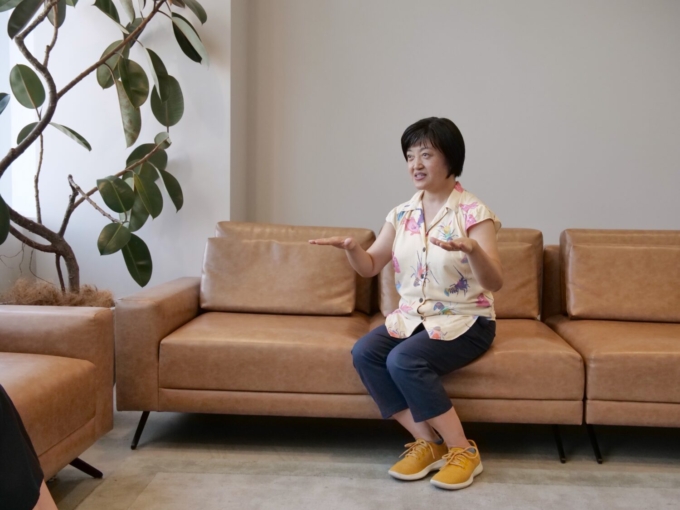
What kind of “Fun buzz” is SSUG aiming to create for society and the environment?
ーー Now, let’s hear from Ms. Tanimura about SSUG’s sustainability efforts.
Tanimura: SSUG is now celebrating its 40th year, and since its founding, our guiding principle has been to “make the world a better place through PR and communication.” This drive is deeply ingrained in our company DNA.
One of SSUG’s most notable social good initiatives is the “White Band Project,” a global advocacy campaign aimed at eradicating poverty. The project’s white wristbands, symbolizing awareness for the alarming reality that “every three seconds, a child’s life is lost due to poverty,” became a sensation in Japan, selling about 6 million units within three months. This movement successfully drew national attention to global social issues like poverty, inequality, and environmental challenges. Most importantly, it gave people a way to take action, making a significant impact by raising awareness and sparking change.
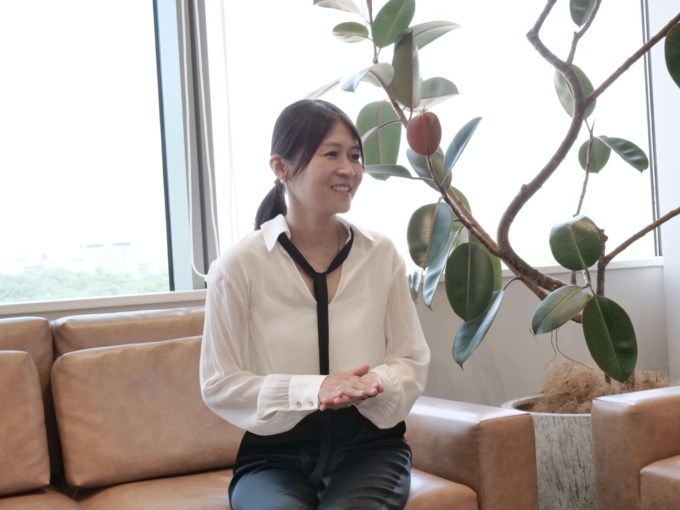
When this project was being carried out, I wasn’t part of the company yet—I was one of the many people who casually picked up a white band at a convenience store and wore it. After joining SSUG and learning more about the project, I remember being deeply moved by its impact. Now, I approach my work with the desire to leverage SSUG’s communication power to actively spread messages that people need to hear, creating meaningful social impact.
I believe that by engaging in socially positive initiatives, we can review our responsibilities from a broad perspective, sparking “fun buzz” that contributes even more to society and the environment.
ーーSSUG has many women actively contributing to its success. As Ms. Torii mentioned earlier, addressing the gender gap is a key part of sustainability. How do you feel about this?
Tanimura: As an Executive Officer at the holding company, I focus on enhancing our corporate value. At SSUG, our CEO is a woman, 60% of our workforce is female, and half of our board members are women. This naturally fostered an environment where women can thrive.
We strive to create a workplace that supports our unique take on diversity, ensuring each member can work in a way that feels authentic to them.
For instance, over the past few years, I’ve focused on “women’s healthcare” as a primary theme, implementing various initiatives. Women often face specific healthcare needs, and each person’s lifestyle is unique—particularly around pregnancy and childbirth. I hope to make it so that no one faces a lack of options because they didn’t know or had access to information too late. By sharing knowledge and encouraging proactive steps, we aim to benefit not only our team but also society at large.
The Story Behind SSUG’s Journey to B Corp Certification
ーーSSUG has recently achieved B Corp certification. Can you share your thoughts on this journey and what you learned along the way?
Tanimura: Achieving B Corp certification requires the entire company to work together as one. Going through the certification process allowed us not only within the Brand Communication Department I belong to, but across all corporate divisions to unite toward a common goal.
Each team, from HR to general affairs and accounting, took a closer look at their roles and impact within the company. It also gave us a valuable chance to reassess the purpose and value of our current policies and practices, ensuring they serve clear targets and objectives.
The BIA scores also highlighted areas where we could improve. For instance, we saw that, while we aren’t a CO₂-intensive company, we need to take more ownership in reducing emissions. It also showed how, though human rights are foundational, there was more we could actively be doing to address them. This assessment made it possible to see our group’s challenges in a new light, which I believe is incredibly valuable for our long-term growth.
ーーWhat were your feelings when you received the B Corp certification?
Tanimura: Receiving B Corp certification was incredibly challenging, so when we got the confirmation, I was on the verge of tears.
However, there are still people who don’t know about B Corp certification, or perhaps have only heard the name without fully understanding its real value. That’s why, first, I want our team members to understand its significance. Moving forward, we aim to strengthen a culture that deeply values sustainability.
The standards for B Corp certification are continually updated, so simply maintaining the status won’t be enough. It’s not just about achieving certification; we need to keep evolving our initiatives and awareness to stay aligned.
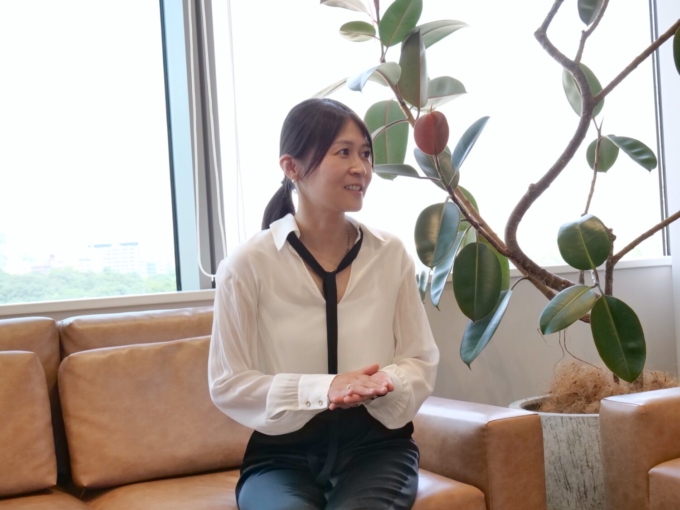
Ms. Torii:I think the journey to achieve B Corp certification is incredibly meaningful. What looks like just a couple of lines in an assessment actually involves a huge amount of work when you start implementing it.
Tanimura: In the assessment, there were multiple-choice questions with options like A and B. Some questions made me think, “Wait, if I choose B, I get a lot more points than A?” Without a real understanding, it’s hard to reach the goal, so it requires a lot of learning.
Ms. Torii:That’s precisely why there’s a unique value to B Corp certification that only companies who’ve gone through it can truly understand.
Tanimura: Absolutely. And, of course, being B Corp certified is a global endorsement of our commitment to sustainability, which is also a big advantage. While it’s challenging to achieve, it’s far from impossible if you’re genuinely committed.
Ms. Torii:It’s inspiring that B Corp certification is accessible to all types of companies, regardless of industry or size. It’s amazing to see so many companies working toward the same goal.
Thoughts on the Future of Sustainability in Japan
ーーWhat are your thoughts on the direction the company should take through B Corp certification?
Ms. Torii:I believe it’s crucial for companies to recognize that they exist to help create an inclusive, fair, and regenerative economy. Without this mindset, businesses themselves might become unsustainable in the future.
Tanimura: It’s essential for companies to proactively consider how they can impact society positively within their own industries. The core focus shouldn’t simply be on obtaining B Corp certification, but rather using it as a stepping stone to reflect on and take meaningful actions toward sustainability.
ーーAs a B Corp-certified company, what sustainability vision does SSUG aim to pursue going forward?
Tanimura: We’re not seeking recognition simply as a company “working hard on sustainability.” For us, making an effort in sustainability is a fundamental part of being a responsible business.
The impact we can make as a group is rooted in our slogan, “Let’s have fun.” We believe this shows up in every communication solution we provide for our clients, and in each social good initiative that companies are undertaking. By promoting awareness of this certification and the current societal landscape to as many companies as possible, we see our role in PR and communications as a unique way to contribute positively to society.
Ms. Torii: We don’t know if B Corp certification will still exist a hundred years from now. But I believe it exists now to make the world better in the future.
Tanimura: Exactly. The true value isn’t just in obtaining the B Corp certification, but in the process of working toward it and clarifying our purpose along the way.
Ms. Torii:With more companies in Japan pursuing B Corp certification, it would be great if we could share both successes and challenges with each other to support better practices.
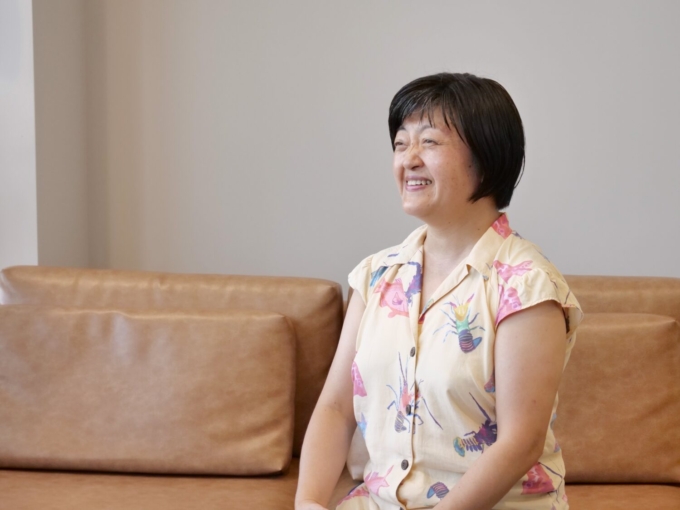
Tanimura: This experience helped me deepen my understanding of sustainability and gave me the opportunity to develop my own perspective.
Our group was also warmly welcomed by existing B Corp companies and felt like part of the community even before we obtained certification. Just as we were supported, I hope our group can now help other companies aiming for certification.
Ms. Torii:B Corp certification is just the beginning—a promise to keep contributing to society. Let’s continue working together to create a more inclusive, fair, and regenerative economy.
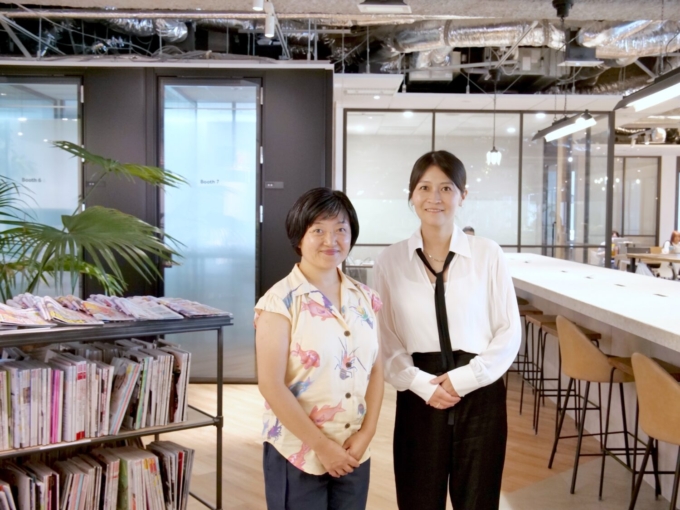
SSUG will keep driving sustainability forward, sparking more “fun buzz” and spreading this movement for positive change!






